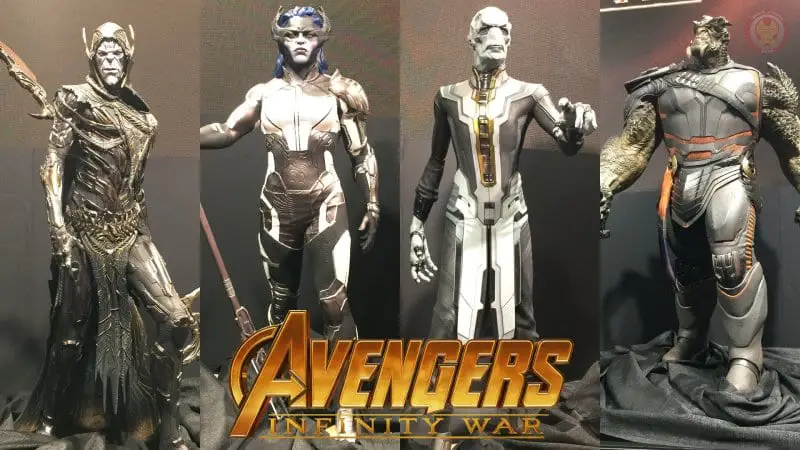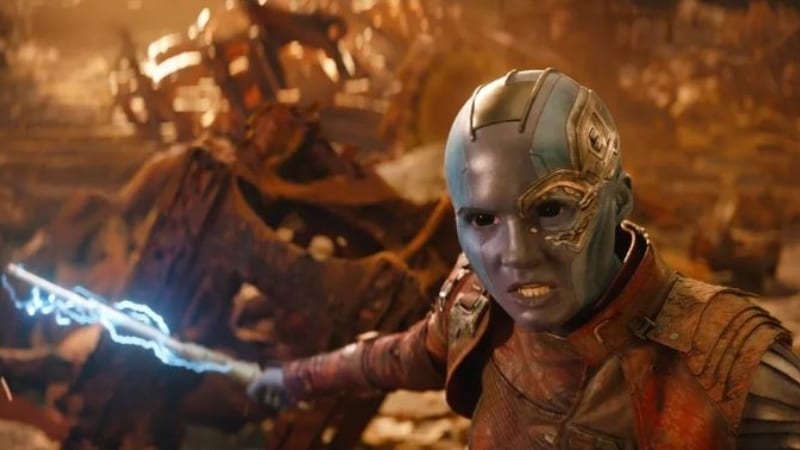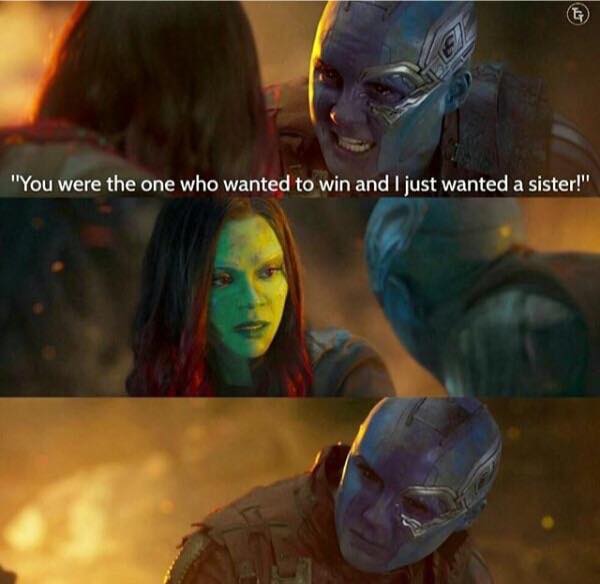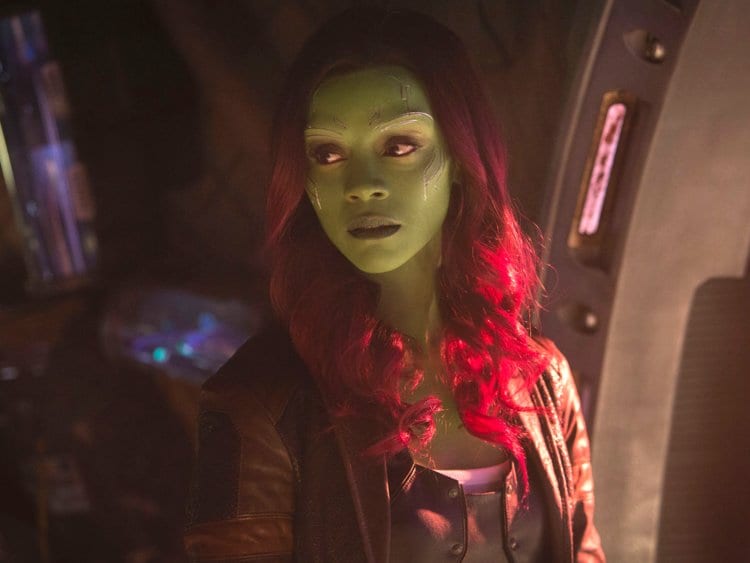Content Warning: This article discusses abuse, both real and as mentioned in the MCU films. Also, spoiler warnings for Avengers: Infinity War
Infinity War came out a little bit ago, and wow, was that a big movie. A lot happened in there. I’m not going to lie, I am a big fan of the Marvel Cinematic Universe (MCU), and really enjoy the franchise. It’s not perfect, of course. I wouldn’t even go so far as to say all of their movies are good, let alone great. More than a few are mediocre, and one of them is on the short list of movies I loathe and actively avoid watching. Their handling of social issues has been…problematic at best. They’re working on it, but still, it’s not perfect. And given that Infinity War is in many ways a celebration of the first ten years of the MCU, it is a microcosm of those issues.
By and large I enjoyed it enough to have seen it three times so far. I wouldn’t say it got deeper with each rewatch the way Black Panther or Guardians of the Galaxy Vol. 2 did, but it didn’t get worse either. And there is quite a bit to talk about. I could talk about why the ending didn’t bother me, since though I know almost everyone who died will come back. I could talk about the deaths themselves—which I found the most meaningful, or which was the most sad. I could talk about how Nebula should be the one to kill Thanos, but that it will most likely be Tony. I could talk about why I am okay with Peter Quill freaking out on Titan…okay, actually probably not; I don’t think I could do that in more than five hundred words.
…Or I could talk about abusive parents. Fun.
So, yeah, this is an article analyzing the way that the MCU portrays abusive parents, specifically Thanos, who somehow manages to find a way to encapsulate three different forms of abusive parenting. The Neapolitan ice cream of abusive parents if you will. We will not be talking about the many, many other bad dads in the MCU, or the comparative lack of bad moms. That’s a whole other discussion that we don’t have time for.
The Children of Thanos and Neglect

Alright, this is the weakest and most tenuous comparison, I admit. But I feel that I would be remiss if I didn’t discuss, at least briefly, the four children of Thanos introduced in Infinity War. They are, from left to right in the picture above, Corvus Glaive, Proxima Midnight, Ebony Maw, and Cull Obsidian. And yes, they’re pretty bad characters on screen, with little backstory and not much in the way of given motivation. One could, and I would, make the argument not every villain needs to be deep, especially enforcers like this, but the quality of them as characters is not the focus of this section.
Instead, I want to discuss how they relate to Thanos’s truly bad parenting skills. And yes, unlike Nebula and Gamora we don’t know explicitly that Thanos raised these four from childhood. However, they call themselves his children, and Proxima even refers to him as ‘Father’ in their one scene with him. It’s also true that they only have one scene with Thanos, and only Ebony Maw mentions him explicitly very much. Probably. Cull Obsidian doesn’t speak English, so maybe he’s just singing Thanos’s praises the whole time—who knows.
Regardless, Thanos doesn’t seem to care about his four loyal children very much. All four die by the end of the movie, and yet Thanos only comments on one of their deaths. Even the one he does acknowledge, Ebony Maw, is brushed aside fairly quickly. He seems unhappy that it happened, but saying that it made him sad feels like an overstatement. His reaction certainly pales in comparison to his reaction to Gamora’s death (We’ll get to that, I promise. I have thoughts).
Now, let’s be clear, at least some of this is entirely due to the flaws in the setup of Infinity War and the fact that these four were never introduced beforehand. I don’t think the Russo brothers or the writers spent a whole lot of time thinking about these four. It is entirely possible that Thanos had a very warm relationship with them that we never saw and he was just too emotionally exhausted to react. But I kind of doubt it. These four call themselves his children, call him father, and he appears to not care in the slightest. Given where the final fight (if you can call it a fight) takes place, he most certainly had to have seen Corvus’s body, and he does not comment on it. He does not even pause.
So, yes, calling his behavior toward them neglect is a weak connection to make, largely due to the weaknesses of Infinity War, but it is something and I wanted to point it out. Now, let’s move on to more meaty subjects.
Nebula and Malicious Abuse

Oh Nebula. My precious blue and purple baby of rage. How I love her. Seriously, it made me inordinately happy to see her on the poster for Infinity War, and her survival was the one true bright spot of the end of that movie. Fortunately for all of us (or at least for me and my article), Nebula’s connection to the subject of Thanos and parental abuse is much, much stronger than that of her previously mentioned siblings. It quite frankly defines her as a character. Just about every decision she makes in every movie she appears in ties into her relationship with Thanos.
First, and most powerfully, is how her relationship with her ‘father’ ties into her body. Unlike Gamora, we don’t get a flashback of how and why Thanos took her in. So, we don’t know exactly what Nebula looked like before. That random purple streak in the middle of her face could be natural. But that metal you see ringing her eye, the plate on the top of her head, and her left arm? All decidedly not something she was born with. And that’s just what we see in this picture. There’s a scene in Infinity War in which her prosthetics are broken up into segments, and there’s less flesh there than there is in Anakin. Hell, from the looks of thing about half of her brain is missing!
The thing is those prosthetics, as far as we can tell, are not the result of some tragic accident, nor were they necessitated by her being maimed in combat. Nebula is likely a very unreliable narrator, but from what she says, every single one of her robot bits was placed in her by Thanos as punishment for losing fights against Gamora. Her word choice makes it a little hard to tell if Thanos ripped the pieces of her out personally or just had someone else do it, but either way, this was her adoptive father causing that pain. To add insult to very literal injury, Gamora is a cyborg too. It’s stated quite explicitly in the first Guardians of the Galaxy movie that Gamora has cybernetic implants that help make her stronger and more durable. But if you look at the differences in the two’s appearances, Gamora’s are either drastically less extensive, or Thanos spent more money on making sure his favorite daughter would look like herself. Possibly both.
Probably both, in fact. While the exact amount that the work on Nebula cost is never stated in the films, she makes it quite clear that she is in pain every moment of every day. She is occasionally seen doing her own maintenance work on herself, and the robotic arm she got from Thanos (the most powerful being in the galaxy who has his own army and fleet of ships) is remarkably similar looking to the arm she got from the Ravagers, a small pirate group with no discernible need for a robotic arm, which means it was likely stolen cargo. Maybe I’m reading to much into things, but it feels rather a lot like Nebula’s parts are durable, but cheap and uncomfortable.
And then there’s her relationship with Gamora. The relationship between Nebula and Gamora is made quite clear: the two were taken by Thanos at roughly the same time and pitted against each other in the name of training. They definitely knew about the other four ‘children’—Nebula references the existence of other siblings in the first Guardians movie—but their relationship with them is never discussed.
Nebula and Gamora’s relationship, on the other hand, is discussed, a lot. In the first movie, it mostly just comes off as sibling rivalry. Though there is a telling scene in which Ronan and Nebula are sitting on an asteroid talking to Thanos in person, and Thanos specifically addresses Ronan, who he disdains. By contrast, he acknowledges Gamora, calling her his ‘favorite daughter’ (in fact, he considers alienating Gamora as big of an issue as Ronan failing to retrieve an Infinity Stone), but does not even look at Nebula.
Still, the meat of their relationship issues are in Vol. 2. And not just in the obvious ways, like their two solo conversations in the second and third acts.

It should be noted that, about halfway into Vol 2, Nebula gives a speech, detailing her plans. It really just boils down to wanting to get every weapon in the galaxy and use them to kill Thanos. As noted above, she’s in a lot of pain all the time, so it makes sense. However, it should also be noted that the minute Nebula gets a ship, the first thing she does is take that ship, track down Gamora, and try desperately to kill her. And not just with the ship’s guns; she purposefully crashes her ship, utterly destroying it and stranding herself on a strange planet, for a shot at her sister.
This isn’t an unrealistic decision. I don’t just mean that it’s consistent with Nebula’s character, although it is. This is actually a something that happens in homes with abusive parents and more than one child. Intellectually Nebula knows that Thanos is to blame for her suffering, but emotionally that’s hard to work on. There’s a tendency for younger children who are victims of abuse to put the blame on older siblings or another parent who failed to stop the abuse. Especially given that much of Nebula’s pain comes from being punished for not being deemed as good as Gamora. That’s a hard thing to live with. And no, it’s not fair to put that on a child, but the mind isn’t always logical, especially when dealing with pain. By the end of the movie, Nebula does manage to overcome her issues with Gamora and the two even make up. It is notable that only once she has made peace with her sister does Nebula go after Thanos himself.
Which brings us finally to Nebula’s actual relationship with her father. As has been surmised, it was not a healthy one. Hell, even by the standards of Thanos’s relationships with his adopted children it’s unhealthy. Gamora’s attempt to murder Thanos is brushed aside. And I don’t mean just by the narrative; Thanos seems rather unconcerned that his favorite daughter tried to kill him. Nebula though? The immediate response is torture, turning her into a rather horrifying piece of forced perspective art, highlighting just how much of her body has been replaced with mechanical bits.
To top that off, in the climatic battle on Titan, Nebula arrives by crashing her ship into Thanos (something tells me that Thanos never taught her how to park) and then confronts him. She tells Thanos that he should have killed her, to which he responds quite nastily that ‘it would have been a waste of parts’; then he proceeds to thrash her.
We will likely never see flashbacks to Nebula’s childhood. I mean, maybe she’ll get shown if they decide to put more Gamora flashbacks in Avengers 4, but that’s about it. So we probably won’t know if Thanos always treated Nebula like this or if it happened later on in her life. But at the end of the day, it doesn’t really matter. What matters is that Thanos took in a child and abused her actively and malevolently until she became a pain riddled, anger-filled mess. Even if Nebula manages to make peace with this, even if killing Thanos brings her some level of comfort, she is unlikely to ever fully recover and become totally healthy. And unlike her four siblings that we already spoke of, Nebula probably knows this, which may be the most tragic aspect of all.
Gamora and Non-malicious Abuse

Now we finally get to the most controversial relationship of the set, Gamora and Thanos. And yes, you read that heading right: non-malicious abuse. Yes, I believe that is a thing. Please, hear me out.
I am the child of abusive parents. My parents were both physically and emotionally abusive, though far more emotionally than physically. My dad never broke any bones or anything, mostly just shoving, slapping, and punching. I lived through abuse, and while I don’t pretend to speak for all abuse victims, I know what speaks to me and my experiences. While I do feel that Guardians of the Galaxy Vol. 2 is one of the best depictions of the varied aftermath of abusive parents outside of films specifically about that, I must confess that Gamora’s story in Infinity War spoke to me more.
First off, there is Gamora’s behavior itself. Much has been said of a certain scene, roughly an hour into the movie, where Thanos tricks Gamora into thinking that she’s managed to kill him. As Gamora watches her abusive adoptive father bleed out, she sinks to her knees and starts sobbing. Not lightly either…full on ugly bawling. I’ve seen some people claim that this undermines Gamora’s abuse—that she should be happy, that she’s never shown this much emotion after killing anyone else, which means that the movie is trying to make it seem like Thanos wasn’t such a bad father.
For me personally, I don’t agree. Again, I’m not speaking for every survivor, just myself. I am twenty-three years old. I know that my parents were abusive. One of my most distinct memories from my childhood is my dad slapping me so hard I fell down and slid along the hardwood floor, because I lied and said I had stolen some of his special crackers to try to keep my siblings from getting in trouble. I know beyond a doubt that my relationship with my parents is unhealthy. And yet, whenever I end up arguing with my parents, even if they never shout, I will start crying. I can’t help it, the knowledge that I’m upsetting my parents is still that painful. I can’t even imagine the pain I’d feel if I was put in a situation where I had to kill one of my parents.
To me, Gamora’s sobbing is out of relief, but also out of pain. And that is okay. People are allowed to feel more than one emotion towards the same thing. It’s natural. Emotions are complex. From my perspective, Gamora sobbing after stabbing her father in both the throat and the heart does not undermine the fact that she is the victim of extensive abuse. Nor does the movie portray her as being forgiving or sympathetic of Thanos at any point. He is a bad person, his parenting methods were abusive, and she knows it. Again, not every survivor of abusive parents will feel this way. Your mileage may vary even among those for whom this is their lived experience. Still, I thought it important to offer an alternative perspective given what I’ve seen around the internet.
Then there is the second scene, and arguably the more controversial one. It’s the one at the very end of the second act with Thanos and Gamora on the top of a mountain with the Red Skull. (Yes, he’s there, no it’s not Hugo Weaving, and no it’s not important to this article.) Thanos learns that in order to obtain one of the Infinity Stones he must sacrifice that which he loves most. Immediately pain, brief denial, and sorrow dominate his face, and he begins to cry as he realizes what this means. Thanos has set himself on a path, convinced himself that it is the universe’s only chance at survival, and that stopping would be a moral failure on his part.
So he takes Gamora and throws her off of a cliff, killing her and retrieving the Soul Stone. Then, throughout the rest of the movie he expresses pain and regret at his actions, stating that while he achieved his goal, it cost him everything. The movie portrays his sadness and love for Gamora as genuine. If it hadn’t been, he wouldn’t have gotten the Stone.
This has upset a lot of people, for a number of reasons. Namely, that by playing Thanos’s love for Gamora as genuine, and his sorrow as genuine, the movie is undercutting his abuse. That by making him feel real love for Gamora they’re trying to make him seem like not so bad a dad.
Even with my experience, I cannot more strongly disagree. The way they portrayed Thanos in this movie struck a deeper cord with me than Allison Janney in I, Tonya, Mo’Nique in Precious, or just about any other abusive parent I’ve seen in media. That’s specifically because of the fact that Thanos is portrayed as having loved Gamora.
Media has a tendency to show abusive parents in a very particular way. Regardless of whether the abuse is physical or emotional or both, the abuser is depicted as being actively malicious and hateful. Sometimes angry, sometimes calmly cruel, and sometimes petty; the point is that the abuser is almost always depicted as hating their victims, or at best being a sociopath who feels nothing for their victim.
The way we depict abusers is important. Depictions help shape how we think of ourselves and our situations. And the overwhelming tendency for media to focus on physical abuse above emotional abuse is a problem. It can lead to children believing that only physical abuse is abuse, or even that only certain physical attacks count as abuse. But there’s another issue, and that is depicting all abusers as malicious. And no, I’m not talking about the need to show victims forgiving their abusers. That is garbage and not depiction I’m interested in.
What I mean is that not all abusers know that they’re abusers. This is something that many LGBT+ people with religious parents have experienced…including me. Maybe I’ve been thoroughly brainwashed or gaslit, but I fully and thoroughly believe that my parents do love me. The emotional abuse was, in their minds, attempts to make me a better person, as fucked up as that admittedly is. They thought they were helping to ensure that I wouldn’t ruin my life by coming out as trans, and that I wouldn’t be punished for all eternity after I died.
It took me years to realize how toxic my relationship with my parents is, and a part of that is because of how media shows abusive parents. Often times, media is how we learn what abuse is. Our parents aren’t going to tell us they’re abusive, and if we don’t realize what’s happening we won’t ask because everyone just assumes that their parents are normal until we see otherwise.
I don’t believe that the text of Infinity War ever attempts to downplay the fact that Thanos is an abusive parent. Yes, he genuinely loves Gamora. But never does the movie suggest that this love is reciprocated. Gamora declares that what Thanos feels for her is not love. She openly rejects food and tells him that she hates him after he’s kidnapped her. She blames him for everything she hates about herself. His statements that he is responsible for everything good about her are never validated or agreed with. Gamora defies him at every turn. She knows that he is abusive, and regardless of what he thinks, she is seeking to end her relationship with him.
But, I believe that showing that Thanos has an entirely different perspective on their relationship, and that he truly believes that he is benevolent is an important thing for them to show. For all of the many flaws demonstrated by Infinity War’s plot, I personally applaud and thank it for this aspect. It struck a chord with me and even if other victims see it differently, I found it valuable.

